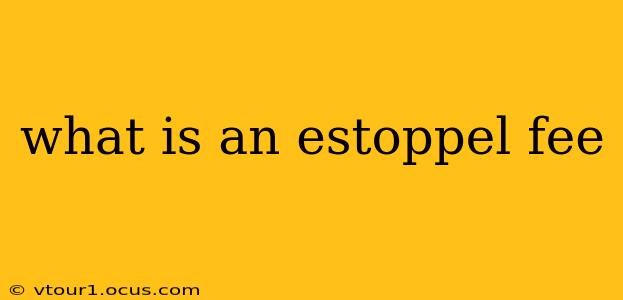An estoppel certificate fee is a charge associated with obtaining an estoppel certificate. But what exactly is an estoppel certificate, and why does it cost money? Let's break it down.
An estoppel certificate is a legal document that verifies certain facts about a property or a loan. It's commonly used in real estate transactions, particularly when a property is being refinanced, sold, or when a lender needs to confirm the status of an existing loan. The certificate is typically signed by the borrower or property owner, certifying the accuracy of the information provided.
The fee for obtaining an estoppel certificate covers the administrative costs associated with preparing and issuing the document. These costs can vary significantly depending on several factors. Let's explore those factors, and then delve into some frequently asked questions.
What Factors Influence the Cost of an Estoppel Certificate?
Several factors contribute to the final estoppel certificate fee. These include:
- The complexity of the transaction: More complex transactions, such as those involving multiple loans or unusual property arrangements, often require more time and effort to prepare the certificate, resulting in a higher fee.
- The lender's policies: Each lender has its own internal procedures and fees. Some lenders may have standardized fees, while others might charge based on the specifics of the request.
- The volume of documents required for review: Before issuing the certificate, the lender may need to review numerous documents to verify the information's accuracy. The more documents that need to be reviewed, the higher the fee might be.
- The urgency of the request: If the certificate is needed urgently, some lenders might charge a rush fee to expedite the process.
- Location: Fees can vary based on geographic location and local market conditions.
Who Pays the Estoppel Certificate Fee?
Typically, the party requesting the estoppel certificate pays the fee. This is often the buyer in a real estate sale, the new lender in a refinancing transaction, or the party initiating the legal process requiring verification. However, the contract for the transaction will specify who bears responsibility for the cost. Always review the contract carefully to understand who is liable for this expense.
How Much Does an Estoppel Certificate Fee Typically Cost?
There's no single answer to this question. Fees can range from a few hundred dollars to well over a thousand, depending on the factors discussed above. It's crucial to contact the lender directly to inquire about their specific fee schedule for preparing and issuing an estoppel certificate. Don't hesitate to shop around and compare fees from different lenders if possible.
What Information Does an Estoppel Certificate Typically Contain?
An estoppel certificate typically contains information such as:
- The outstanding loan balance: The total amount still owed on the loan.
- The interest rate: The current interest rate of the loan.
- The monthly payment amount: The amount due each month.
- Any late payments or defaults: A record of any instances where payments were late or the loan defaulted.
- The maturity date: The date the loan is scheduled to be paid in full.
- Any modifications or amendments: Details of any changes made to the original loan agreement.
Why is an Estoppel Certificate Necessary?
An estoppel certificate is a crucial tool for ensuring accurate information in real estate transactions. It protects all parties involved by providing a clear and concise record of the loan's status. Without it, there's a risk of discrepancies or disputes arising later in the process.
What Happens if Information on the Estoppel Certificate is Incorrect?
Incorrect information on an estoppel certificate can lead to significant problems and disputes. This could delay or even derail the transaction, potentially resulting in financial losses for the involved parties. Therefore, it's crucial that all information provided is accurate and verified by the issuing lender.
This information is for general knowledge and should not be considered legal or financial advice. Consult with a qualified professional for guidance specific to your situation.
